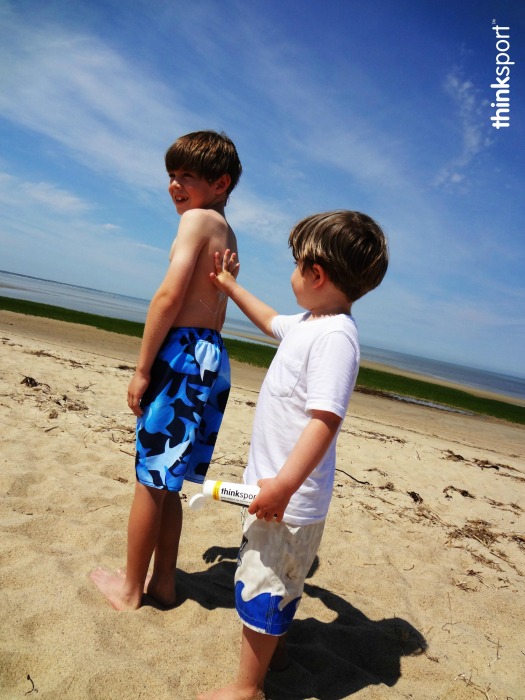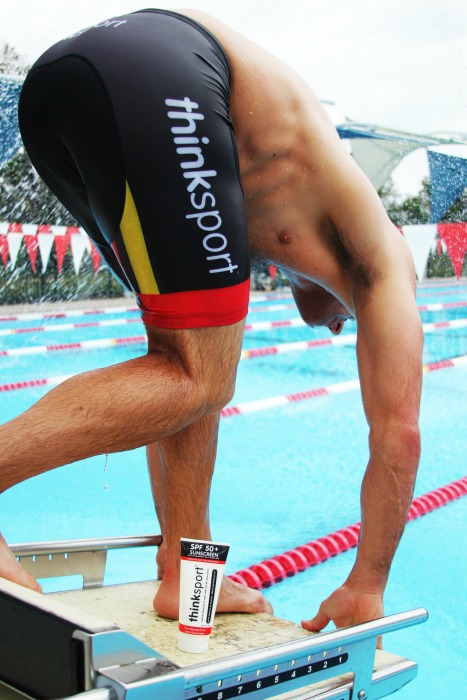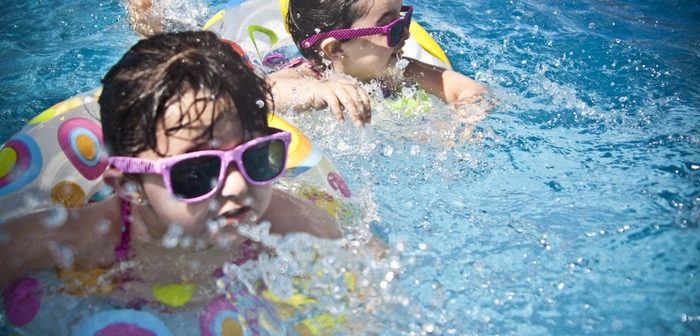The Straight Goop On Sunscreen
 With summer upon us, even if it doesn’t quite seem like it, folks need to start thinking about sunscreen. Okay, let’s dispel that concept first. UVA rays are the same whether it’s January or August, so you should consider sunscreen as a year-round effort, just like brushing your teeth.
With summer upon us, even if it doesn’t quite seem like it, folks need to start thinking about sunscreen. Okay, let’s dispel that concept first. UVA rays are the same whether it’s January or August, so you should consider sunscreen as a year-round effort, just like brushing your teeth.
A couple of motivational facts to increase to your interest in your use and children’s use of sunscreen: One bad burn before the age of 16 and you double your chances of cancer. (“Dear 16 Year Old Me”) Okay, that’s not good. On the brighter side, a recent study showed that daily use of sunscreen reduces skin aging by 24%.
So now you head to your local drugstore to buy sunscreen and suddenly you’re confronted by a vast number of solutions all touting different benefits and the promise of protection. There is definitely a lot of confusion about sunscreen, and it’s probably on purpose.
So we thought, we’d give you the straight goop on sun protection, so you can focus on having fun in the sun.
Understanding SPF
First, consumers have been led to believe that ultra-high SPF numbers like 70 and 100 provide much more protection than SPF 30. False. SPF 30 provides 97% protection from UVB and SPF 100 provides 99% coverage for UVB. Basically, you’re getting a marginal increase in protection. And unfortunately, the chemicals that are used to boost SPF are not favorable. We tell folks if you look at the back of the tube and you see a bunch of words you don’t recognize, you probably don’t want to put that on your skin. The FDA weighed in on this issue in 2012 and has set the limit going forward to SPF 50+. Keep in mind that SPF is just a measure of UVB (Think “B” burn). The ultra-high SPF numbers have caused people to spend far more time outside than they should be. SPF doesn’t provide you any insight into UVA protection. UVA is linked to skin damage and the more harmful forms of skin cancer. So it is really important that you’re using a truly Broad-spectrum formula that covers UVA and UVB. The FDA has also ruled on this in 2012 and identified a standard. If the front of the tube doesn’t say broad-spectrum, you probably want to avoid purchasing or using that formula.
Safe Sunscreen
Just google searching chemical sunscreen and you’ll find a raging debate on ingredient safety and efficacy. We all like to think that chemicals that we interact with on a daily basis are regulated by some aspect of the government. But, the reality is that the cosmetic and chemical industries are highly unregulated. There are 80,000 chemicals in commerce today and only 5 have been removed from use over the last 30 years… Yes if that seems ridiculous, you are correct.
There are two types of sunscreens on the market. The first is chemical sunscreen. They work by taking the UV light and try to convert the light into something less harmful. The downside is that they not only generate free radicals, but the chemicals themselves are highly questionable. Luckily there is a database that provides unbelievable support in locating information relating to these ingredients. The database was put together by the Environmental Working Group and its called Skin Deep. The database currently has over 1500 sunscreens entered, but even if you don’t find your formula, you can easily put each individual ingredient into see its safety rating. The second types of sunscreens are mineral based solutions. You’ll either see Zinc Oxide or Titanium Dioxide as the active ingredient. Mineral sunscreens work by reflecting the UV light. Keep in mind it’s important to understand what is in the inactive ingredient list. It is easy for harmful chemicals to make their way into that list as well. So solely focusing on the active ingredients will only provide you part of the safety story.
Chemical sunscreens make up the majority of the market, unfortunately. They are both cheap and apply clear. Mineral based solutions can cause some amount of whitening during use and are also more expensive. But at what cost is it cheaper. Some mineral base formulations have also taken to using clear zinc or nanoparticle-sized zinc or titanium. We recommend sourcing a non-nano zinc oxide solution. There is just not enough data on the ability of nanoparticles getting into the blood stream. As such, it is better to embrace the Precautionary principle. No brand of sunscreen can market to children less than 6 months of age. You should consult with your doctor before applying any sunscreen. Our suggestion would be to ask them about skin patch testing and also bring the ingredients deck. The incidence of allergic responses has skyrocketed over the last two decades. Any sunscreen that is marketing itself as “hypo-allergenic” is engaged in false marketing. There are plenty of natural ingredients (like nuts) that children are allergic too. There is just no way of guarantying allergic response.
Water Resistance
There are now three levels of water resistance. Not water resistant, water resistant (40 minutes) and water resistant (80 minutes). We have all become used to seeing words like “sweatproof” or “waterproof”. The FDA kicked that terminology out. There are now very specific tests. Keep in mind, that if you’re at the beach or pool that you’ll need to reapply after being in the water. And to achieve the SPF factor of your sunscreen you have to reapply every two hours. One application does not keep you at SPF 50 or whatever is on the sunscreen label. And you should be using about 1oz to cover an adult body.
Aerosols and Wipes
A lot of consumers like sprays and wipes due to the ease of application. There are several problems here, though. First, who knows what you and your children are inhaling. Companies should be required to provide proof via studies that the ingredients in the aerosols are safe. Second, a recent study showed that parents were applying 25% of the right amount of sunscreen. SPF is a logarithmic function. So 25% of SPF 50 means you’re getting something closer to SPF 3. People end up spending more time out in the sun, not realizing that they’re getting a heavily reduced protection from UVB. And it is scary to think how much UVA that they are consuming.
Sun Safety Tips
So the scary stat is that skin cancer is the most prevalent form of cancer. There are more incidents of skin cancer than all of the other cancers combined. (Stern 2010)
The good news is that it is the most preventable.
It starts with wearing protecting clothing from hats, long sleeves and sunglasses. The next step is to stay out of the sun during peak UVA and UVB of 10 am to 4 pm. Use umbrellas or setup for outdoor activities in the shade. Remember that overcast days do not mean you’re not getting UV exposure. And finally, use safe, non-toxic sunscreen. Don’t forget to consult the Environmental Working Group’s database Skin Deep: ( http://www.EWG.org/SkinDeep ). Type in your sunscreen name or enter each ingredient into the database. You’re looking for a sunscreen that carries an overall “1” rating in EWG.
Bottom line: Protect your skin. After all, it’s your largest organ…




Thanks so much for sharing all this info. Sunscreen is a lot more involved than people think.
Just hearing the word CHEMICAL in Sunscreen makes me cringe! I am so glad there is a great option for non-chemical sunscreen! Thanks for the heads up!
Sunscreen is SO incredibly important to put on. Didn’t even realize it can help with aging skin, but it totally makes sense!
Thanks for explaining the difference on sunscreen coverage. I really thought that the higher the number, the more coverage you get.
Thanks for explaining the difference in sunscreen coverage. I really thought that the higher the number, the more coverage you get.
I needed this reminder to stock up on sunscreen. I try to buy everything that I can with no chemicals in it for my family. I’ll check this brand out.
Sunscreen is super important. I plan on spending quite plenty of time at the pool with the kids this summer. I can’t wait. I have a feeling that we will go through several bottles of sunscreen too.
Sunscreen is super important. I plan on spending quite plenty of time at the pool with the kids this summer. I can’t wait. I have a feeling that we will go through several bottles of sunscreen too
When my kids were little, most of the sunscreens were filled with chemicals. So glad to see there are more options now.
This is great! Kids get so much sun exposure since they live outdoors it seems like so I’m glad they are protected!
OK now this is a useful post, I seem to get more confused by sunscreen as the years go by! So I am bookmarking this for use later in the year!
We pay pretty close attention to this, my FIL has had a couple of go arounds with skin cancer, thankfully he’s kicked it both times, but needed some skin grafts this time around.
This was a very thorough education on sunscreen and why we shouldn’t skip it. I will keep this in mind during these hot months.
The kids did a great job with the post about sunscreen. It is so important to choose the right sunscreen for yourself and to reply it eve so often especially if you are swimming.
Ooooo this sounds like one fabulous sunscreen option! With summer right around the corner I will need to grab some
Sunscreen selection has always been difficult for me. This helps me understand what I am choosing. Thanks!
sunscreen is so needed in the country now because its super summer hot
Thank you for all of this info! Protecting your skin is so important!
Great post. Now I know that right sunscreen is key during summer and cheaper ones are usually not right for children’s skin.
Thank you for sharing all of this wonderful information. I always try to look for natural and non-toxic sunscreens.